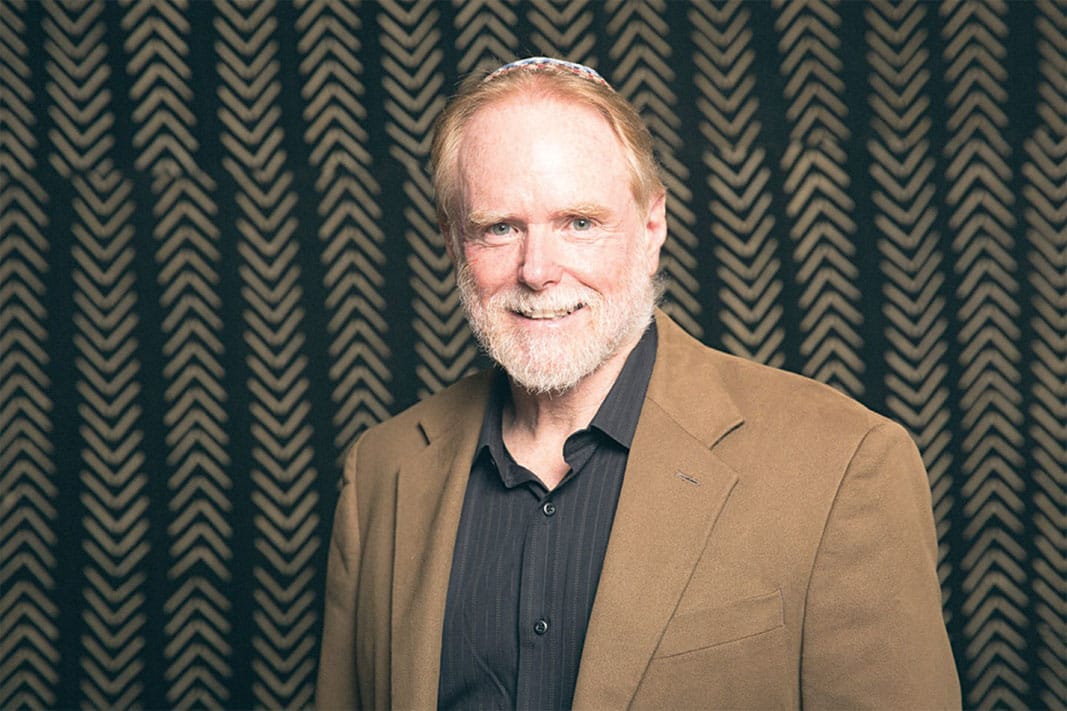 Rabbi Mordecai Finley
Rabbi Mordecai Finley An honest accounting of the past year would have to acknowledge some of the most difficult shared realities we’ve faced as Jews, Americans and human beings in quite some time. So it seemed appropriate to ask a spiritual leader to reflect on his own spiritual struggles.
But Mordecai Finley wasn’t taking the bait.
“To be honest, I don’t have spiritual trouble or conflict,” the rabbi and founder of Ohr Hatorah in Venice said when I called him to chat.
It’s not that Finley doesn’t have problems — he’s human, after all — it’s that he has deep confidence in his ability to cope with them.
He attributes this unique mental fortitude to his experience training and serving in the United States Marine Corps. In fact, he sees a direct line from mastering close-order drill to his role serving the master of the universe.
“It’s a mystical experience,” Finley said of boot camp training.
He described drill formation in reverential, poetic detail — the moving in unison, the order of arms. The way he tells it, the precision and perfection demanded of trainees becomes a kind of spiritual flow. “Eighty people become one,” he said. “It’s like dance, like watching ballet.”
Well executed drills could be beautiful, yes, but they were also among the hardest things Finley has ever experienced— physically, psychologically, spiritually.
“You had to be 100% present and accountable every day or the consequences were enormous,” he said.
Anyone who has seen certain Hollywood movies knows this familiar scene: the soldiers in training collapse, exhausted and desperate, broken into submission.
“But something ethereal happens when you overcome the defiant, noncompliant parts of yourself,” Finley said. “There’s a kind of clarity that happens.”
He called this clarity devekut l’misima — a concept from the Israel Defense Forces, meaning “devotion to the mission.”
“This began my spiritual path,” Finley said. “I grew up in a left-wing progressive family, and [prior to serving] I thought the way you change people is through law. But in the military I saw myself and others transform before my eyes. And it wasn’t because of the uniform code of military justice; something internal had changed.”
Finley recalled a day during training when his platoon was marching on the beach and any deviation from complete uniformity resulted in punishments like 100 push-ups. Before long, the entire platoon collapsed on the beach, panting or passed out, depleted. That’s when the drill sergeant reminded them of the 1950 Battle of the Chosin Reservoir, a defining episode of the Korean War, in which 30,000 U.S., Korean and British troops fought against 120,000 Chinese soldiers in brutal conditions. The result was a bloodbath, but the marines famously carried out their dead.
“You weaklings would have left them behind,” Finley remembers his drill sergeant said.
“Suddenly we all stood up as one person. That story completely changed our physical sense of self. I thought, ‘Well, that’s the power of myth.’ So I instantly understood the power of religion.”
After he completed his service, Finley decided to become a rabbi.
“I had seen enough moments where myth, honor and duty transformed people,” he said.
But most of Finley’s congregants haven’t served in the marines. How does he impart the lessons of that experience, which was so visceral, and served him so well, to his congregation?
‘When you have honor, you have an honor code. And there’s an honor code for relationships, for families, for parents and children.’
“I appeal to virtues such as honor, integrity and duty that nearly every human being can understand,” Finley said. “When you have honor, you have an honor code. And there’s an honor code for relationships, for families, for parents and children. [In Judaism] we say, ‘honor your parents.’ Well, what’s the honor code?”
God knows the human experience presents an endless array of challenges and crises. But most of the time, they need not be overwhelming, Finley said. His view is that a person’s ability to cope is directly related to how well prepared they are.
“The secret to life,” he said, “is to train.”
Fast Takes with Rabbi Finley
DANIELLE BERRIN: What’s currently on your night-table?
MORDECAI FINLEY: “Why Religion Matters” by Huston Smith. He’s such a beautiful human being and part of me never wants to be far from him
DB: Last show you binge-watched?
MF: Ozark.
DB: Your day off looks like…
MF: I don’t have a day off.
DB: Favorite thing to do in Israel?
MF: Body surf on the beach in Tel Aviv
DB: Something about you most people don’t know?
MF: I’m pretty open about myself. I have to think about that.
DB: Most essential Torah verse?
MF: The light of God is the human soul, proverbs 20:27
DB: Biggest challenge facing the Jewish world…
MF: Lack of wisdom
DB: Guilty pleasure
MF: Chocolate
DB: Favorite Jewish food
MF: Matzah brei
DB: If you weren’t a rabbi you’d be…
MF: In the military























 More news and opinions than at a Shabbat dinner, right in your inbox.
More news and opinions than at a Shabbat dinner, right in your inbox.